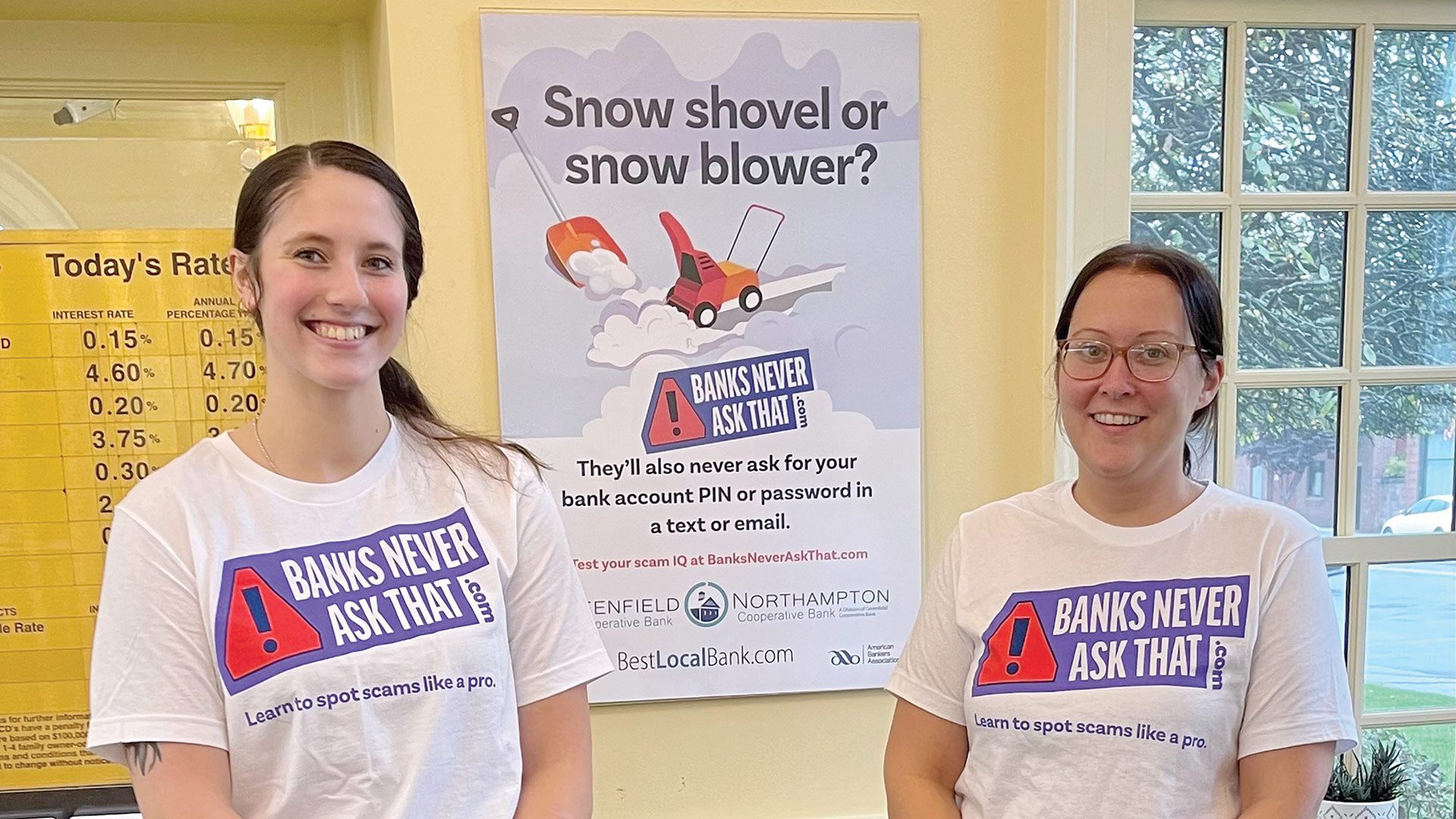Knowledge Is Power

Greenfield Cooperative Bank employees actively participated in scam-prevention education during Cybersecurity Awareness Month.
$8.8 billion. With a B.
That’s how much money, according to the Federal Trade Commission (FTC), consumers lost in 2022 to phishing scams and other fraud — an increase of more than 65% compared to 2021.
It’s a number leaders at Greenfield Cooperative Bank (GCB) take seriously, which is why it’s participating, for the fourth straight year, in #BanksNeverAskThat, an online campaign by the American Bankers Assoc. in partnership with banks across the U.S. to educate consumers about the persistent threat of phishing scams.
To combat those attacks, the campaign uses attention-grabbing humor and other engaging content to empower consumers to identify bogus bank communications asking for sensitive information like their passwords and Social Security numbers.
“We are proud to join the ABA #BanksNeverAskThat campaign to educate our customers and the community about how to protect themselves from phishing scams,” GCB President and CEO Tony Worden said. Phishing is a serious threat that can compromise your personal and financial information, and we want to help you avoid falling victim to it.”
“Phishing is a serious threat that can compromise your personal and financial information, and we want to help you avoid falling victim to it.”
Among the bank’s messaging to customers, Worden continued, “we never ask you to provide sensitive information like your account number, PIN, password, or Social Security number in an email, text, or phone call. If you receive a suspicious message that claims to be from Greenfield Co-op, do not click on any links, open any attachments, or reply with any information. Instead, contact us directly using the phone number on the back of your card or on our website.”
Considering the uptick in phishing and other scams — and the continued effectiveness of such techniques — the ABA says such messaging is more important than ever.
“By impersonating a bank, a scammer can steal thousands of dollars with just one text message, phone call, or email,” said Paul Benda, senior vice president for Operational Risk and Cybersecurity at ABA, adding that, with the support of individual banks, “the campaign seeks to turn the tables by arming consumers with the information they need to outsmart the scammers and protect their money.”
Throughout Cybersecurity Awareness Month in October, Greenfield Cooperative Bank shared consumer tips on social media and highlighted the campaign in its branches with posters and employee T-shirts.
Because cybersecurity education and fraud awareness can often be dull and forgettable to many consumers, the #BanksNeverAskThat campaign is designed to be bright and bold, with a bit of comedy.

Lisa Pandolfi, fraud analyst with Freedom Credit Union, discusses strategies to avoid financial scams with an audience at Southwick Villages.
“Would you rather give up sugar or salt?” one of the campaign’s social-media posts asks users. “Banks texting you about sweet vs. savory would be just as weird as banks texting you a link to log in, ’cause #BanksNeverAskThat.”
The campaign’s short videos offer similarly ridiculous scenarios like wallpapering a room with cash, roasting marshmallows over a cash fire, and recycling cash on garbage day to remind people they stand to lose real money if they aren’t vigilant.
At banksneveraskthat.com, consumers will find a new, interactive quiz; a video game called Scam City; engaging videos, and tips on how to spot phishing scams. This year, the campaign is also offering a Spanish-language version of the website, bancosnuncapideneso.com, and providing a host of other scam education and consumer resources in Spanish.
Targeting the Elderly
Greenfield Cooperative Bank has also reached out to local Councils on Aging with tips on how to spot scams, and for good reason. According to the FBI’s 2022 Elder Fraud Report, Americans over age 60 lost $3.1 billion to fraud in 2022, an increase of 84% from 2021. That’s the highest loss amount reported out of any age group.
To combat that trend, Freedom Credit Union announced it has taken action to help its members and the community at large, particularly the vulnerable senior population, protect themselves. Most recently, those efforts included free educational sessions at senior centers throughout the region, including Agawam, East Longmeadow, West Springfield, and Chicopee.
Freedom’s team also led a fraud-education seminar for Health New England employees in Springfield, as well as at the Senior Health and Safety Expo in Greenfield, sponsored by the Franklin County Sheriff’s Office TRIAD Unit.
The next session open to the public is scheduled for Wednesday, Dec. 20 at noon at the Pleasant View Senior Center, 328 North Main St., East Longmeadow. The seminar is free, and lunch is available for $3. Registration is required by Dec. 19 by calling (413) 525-5436.
“We have long been committed to helping our members and community protect their identities and finances from criminals,” Freedom Credit Union President Glenn Welch said. “We regularly communicate with our members about new scams and maintain a robust Cyber Security Center with resources for consumers on our website.”
One recent post on that site details the ‘grandparent scam,’ in which a fraudster acquires a consumer’s personal information through various means, such as mining social media or purchasing data from cyber thieves, then uses that information to contact the victim with a deceptive story, claiming to be in a crisis and needing financial assistance, sometimes even spoofing the caller ID to make it seem as though the name and number are coming from a trusted source.
“We have seen firsthand that seniors are especially at-risk targets, so we developed these free educational seminars to help them shore up their defenses,” Welch noted.
During these public sessions, Freedom’s security experts discuss how some of the most common scams work, red flags to look for, strategies to maintain security, and resources for those who think they may be victims. Older adults are often prime targets for financial cons, as they may have accumulated significant savings and valuable possessions; may not be as technically savvy to online, social, and telephone scams; or may be perceived as easier to confuse and intimidate.
“People are often embarrassed if they fall victim to these crimes, but it can happen to anyone,” Welch added. “Scammers have become increasingly sophisticated in their approaches, which can appear quite legitimate. Education is essential to prevention. The sessions we’ve held so far have been well-attended and popular. They offer an open and safe forum for seniors to talk freely and ask questions.”
Senior centers or community organization wishing to schedule a financial scam-prevention session at their facility can call Lisa Pandolfi, fraud analyst at Freedom Credit Union, at (413) 505-5717.
—Joseph Bednar




 “The most recent fraud attempts include continued false unemployment claims and theft of identities through mail interception.”
“The most recent fraud attempts include continued false unemployment claims and theft of identities through mail interception.”

